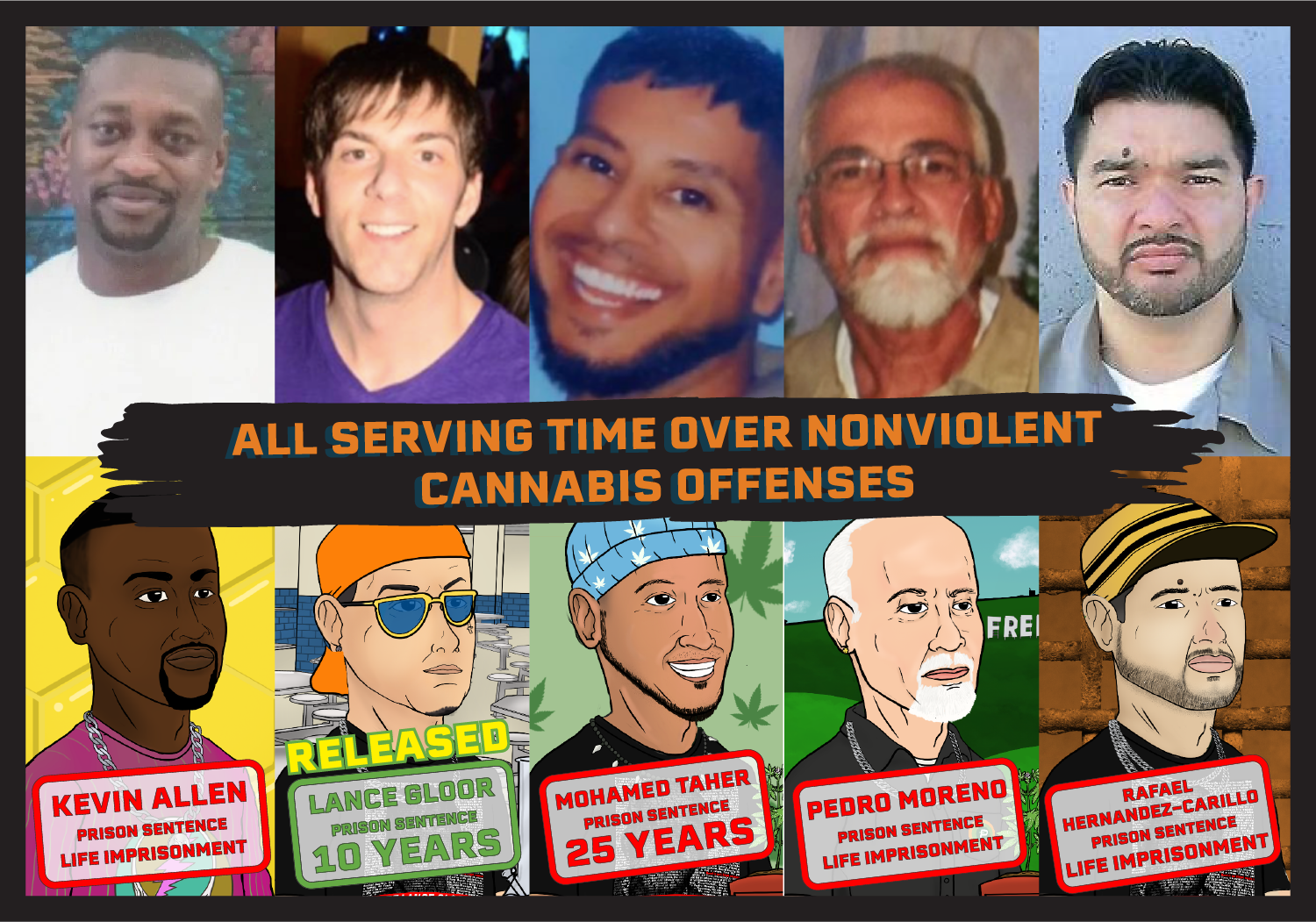
Change is Coming
Change is on the horizon for the United States criminal justice system, with significant amendments to the Federal Sentencing Guidelines set to take effect on November 1, 2023. These amendments mark a significant shift in federal sentencing, particularly for nonviolent marijuana offenders. Our community at 40 Tons, an organization deeply impacted by these issues, is optimistic about the positive changes these amendments could bring, providing hope and a potential path to freedom for many incarcerated individuals.
In the complex landscape of legal reforms and promises of change, it is not uncommon for those of us in the advocacy community, especially at 40 Tons, to approach new legislation and political commitments with a healthy dose of skepticism. Our journey has been marked by moments of hopeful anticipation, only to be met with unfulfilled promises and the status quo remaining firmly in place. Particularly when it comes to the commitment of releasing nonviolent cannabis offenders – a vow that has been reiterated across numerous campaign trails, yet has often resulted in minimal tangible change.
So, when the news broke about the amendments to the federal sentencing guidelines, it was met with an initial reluctance, a pause, born out of previous experiences of disappointment. But upon closer inspection, it became evident that this was not just another hollow promise or an ineffective policy change. This was, in fact, a substantial shift in the narrative and a genuine stride towards justice.
The recent amendments to the federal sentencing guidelines brought back vivid memories of a pivotal moment that transpired a few weeks prior to Corvain Cooper's potential release. I received a call from Weldon Angelos of Project Mission Green, his tone filled with cautious optimism. "While I cannot guarantee the outcome of what happens to Corvain, my instincts tell me that your friend is on his way home," he expressed, alluding to the potential of Corvain receiving presidential clemency. We spoke almost every day the week leading up to former president Trump's last day of office. We really felt we had an actual shot at getting our friend home.
Miraculously, on January 20, 2021, that potential turned into reality, and Corvain was granted his freedom.
The sentiments experienced then are resurfacing now, as we witness the tangible impact of the amendments to the sentencing guidelines. This isn't just a fleeting promise or some bullsh*t lip service; it is a concrete shift in the legal landscape. As of November 1, 2023, these amendments are in effect, bringing with them a renewed sense of hope and a reaffirmation that change is not only possible but is happening before our very eyes.

Here is a breakdown of the new changes.
Amendment 821: A More Compassionate Approach to Criminal History
According to David & Hoss Attorney’s at law, The proposed Amendment 821 introduces vital changes to how criminal history is considered in federal sentencing. For less severe criminal histories, “status points,” which previously increased sentencing ranges, will no longer apply. This is a significant step towards fairness, as data from the United States Sentencing Commission shows that status points disproportionately moved offenders into higher criminal history categories, without substantially predicting the likelihood of reoffending.
Furthermore, for “zero-point offenders,” individuals with no criminal history points and no aggravating factors in their current offense, a decrease of two offense levels is now possible. These individuals have shown to recidivate at a much lower rate, and this amendment acknowledges their potential for rehabilitation. It also responds to the directive from Congress to consider alternatives to imprisonment for first-time, non-violent offenders.
Part C of Amendment 821 introduces the possibility of a downward departure in sentencing for prior marijuana possession convictions. This is a long-awaited acknowledgment of the changing landscape of marijuana legislation across various states, and its impact on federal sentencing. Many states have reduced or eliminated penalties for marijuana possession, yet these convictions continued to influence federal sentencing. This amendment offers a chance for recalibration and justice.
Amendment 814: Expanded Grounds for Compassionate Release
The introduction of Amendment 814 marks a significant expansion of the grounds on which compassionate release can be granted. This includes a broader consideration of medical circumstances, such as the need for long-term care or risk factors related to infectious disease outbreaks, including COVID-19. This ensures that individuals in custody, particularly those at increased health risk, have a pathway to seek sentence reductions.
The amendment also revises the “family circumstances” criteria, acknowledging the caregiving needs of incapacitated family members, whether they be children, parents, or others with a familial-like relationship to the defendant. This reflects a more compassionate approach to sentencing, recognizing the familial responsibilities and bonds that extend beyond the traditional nuclear family.
A new category, “Victim of Abuse,” addresses the needs of individuals who have suffered sexual assault while in custody. This is a direct response to the prevalent issue of sexual abuse in federal prisons, ensuring that victims have an avenue for justice and potential sentence reduction.
The “Other Reasons” category remains a broad provision, empowering courts to consider any other reasons of similar gravity to those enumerated, providing a flexible tool for justice.
Lastly, the “Unusually Long Sentences” category responds to disparities in sentencing over time, allowing for the consideration of changes in law and sentencing guidelines, provided the defendant has served at least ten years of their sentence.
Does this mean that prisoners like Mohamed Taher, Pedro Moreno, Parker Coleman, Edwin Rubis, Rafael Hernandez,and so many more are coming home? We sure hope so!

Implications for Marijuana Offenders and Real-Life Cases
These amendments open new doors for nonviolent marijuana offenders, providing avenues for sentence reductions and justice. Individuals like Mohamed Taher and Parker Coleman, whose lives have been significantly impacted by harsh sentencing laws, now have a tangible chance at having their sentences reduced and regaining their freedom.
Parker Coleman received 60 years! Mohamed Taher received 25 years!
The case of our friend and co-founder Corvain Cooper is a testament to the need for these amendments. Cooper, who received a life sentence for a non-violent cannabis offense, was granted freedom only through a presidential clemency. These amendments ensure that individuals in similar situations have more accessible paths to justice, without having to rely solely on executive intervention. Imagine that? Only being able to get out of prison if the president of the United States allows it? That’s like winning the lottery. It rarely happens! By the grace of God, we did it with Corvain.
The amendments to the Federal Sentencing Guidelines represent a monumental shift towards a more just and compassionate criminal justice system. For the community at 40 Tons, and countless others impacted by harsh sentencing laws, particularly for non-violent marijuana offenses, these changes provide hope, justice, and a chance for redemption. As of November 1, 2023, we stand on the brink of a new era, where fairness, compassion, and justice take center stage in federal sentencing.
If you are aware of any individual unjustly incarcerated for cannabis offenses, we implore you to contact us immediately. Our commitment is to serve as a bridge, connecting you to prestigious law firms and dedicated organizations that are actively working on these crucial legal motions. We stand firmly in our resolve to ensure that not a single individual remains confined for cannabis offenses a moment longer than necessary. Together, let’s mobilize our resources, expertise, and collective determination to bring these individuals back home where they belong. The time for action is now—let's make a difference and right these wrongs together.
Just because someone carries it well, doesn’t mean it isn’t heavy! No one should be in prison for cannabis while there is a booming billion dollar industry. Its time to let these guys go!
By: Anthony Alegrete
I am not a lawyer, or giving legal advice. Please consult an attorney as it relates to your case or the true interpretation of the law.
Sitings:
https://www.ussc.gov/sites/default/files/pdf/amendment-process/amendments-in-brief/AIB_821.pdf.
https://www.ussc.gov/research/data-reports/retroactivity-analyses-and-data-reports.
https://www.ussc.gov/sites/default/files/pdf/amendment-process/amendments-in-brief/AIB_814.pdf.
QUICK LINKS
NEWSLETTER SIGN UP
4ortyTons | Website Built on KUSHY

